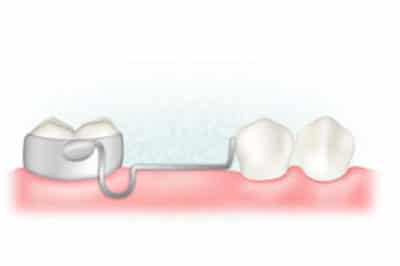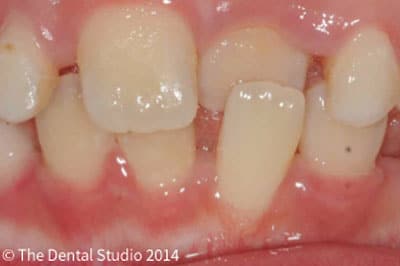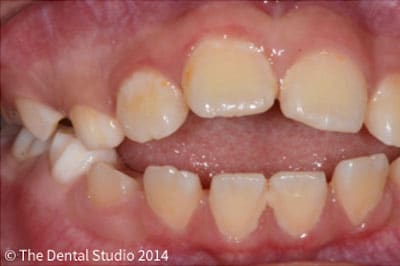Kids Crooked Teeth Treatment and Prevention Before Braces
Crooked Teeth Prevention and Treatment
Space Maintainers
Usually due to Early Childhood Caries, the early loss of baby teeth in your child may result in drifting of the adjacent teeth into the empty space. This can lead to improper guidance of the erupting permanent teeth in that area, and eventual crooked teeth.
Generally the effect is not so pronounced in the front baby teeth, but for early loss of a back tooth or molar, the fabrication of a stainless steel space maintainer is sometimes necessary to preserve the space. This requires regular monitoring and good oral hygiene to upkeep, as the space maintainer has to be removed in a few years once the permanent tooth under it begins to show signs of eruption.
If a permanent tooth has been lost in an older child usually as a result of accidental trauma, the space maintainer may come as a form of a removable plastic plate worn in the child’s mouth with an acrylic tooth to simulate the lost one. This helps to maintain the space until adulthood when more permanent treatment such as an implant can be planned.


Interceptive Orthodontics

Many malocclusions (crooked teeth and improper bites) seen in the permanent dentition are formed as soon as the first adult teeth erupt. From as early as age 6, it is possible to determine if your child will need to straighten teeth at a later age. Fortunately, early treatment may also be possible to correct certain malocclusions and to prevent or minimise any major orthodontic treatment in the future.
This is the practice of interceptive orthodontics, and the key to its success is early diagnosis and treatment planning. The general dentist or an orthodontist will assess your child to determine the best timing and method for correcting certain malocclusions.
The usual age for children to wear braces is around 12, or in Secondary One.
If any interceptive treatment is possible, it may commence earlier at around age 8, and come in the form of simple metal braces or a removable plastic plate that can be worn in the mouth and removed periodically for cleaning. Generally, interceptive orthodontics may be used to correct cross-bites (as seen in the picture), mild crowding in the front or back, and some jaw discrepancies.
Habit Appliances

It is common for children to suck their thumbs or pacifiers. However, if this habit persists into well into their schooling years, dental problems can occur when the permanent teeth begin to grow. Depending on frequency, intensity and duration, the pressures created from thumb or pacifier sucking may cause the teeth to be pushed out of alignment.
An example of this is the formation of an anterior open bite, as seen in the picture, where a gap in the front teeth has been created.
The first line of corrective treatment often involves behavioral therapy, failing which certain safe appliances such as a simple plastic plate may need to be attached to the back of the teeth temporarily in order to break the habit.
If stopped early enough, the teeth will usually resume their normal alignment naturally.


